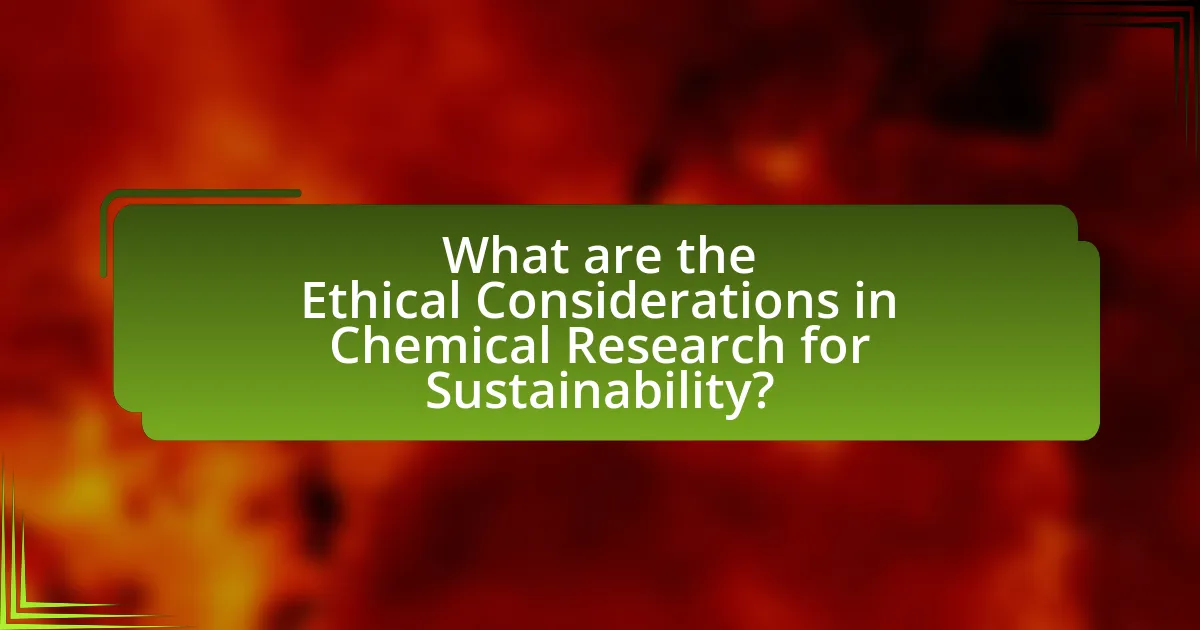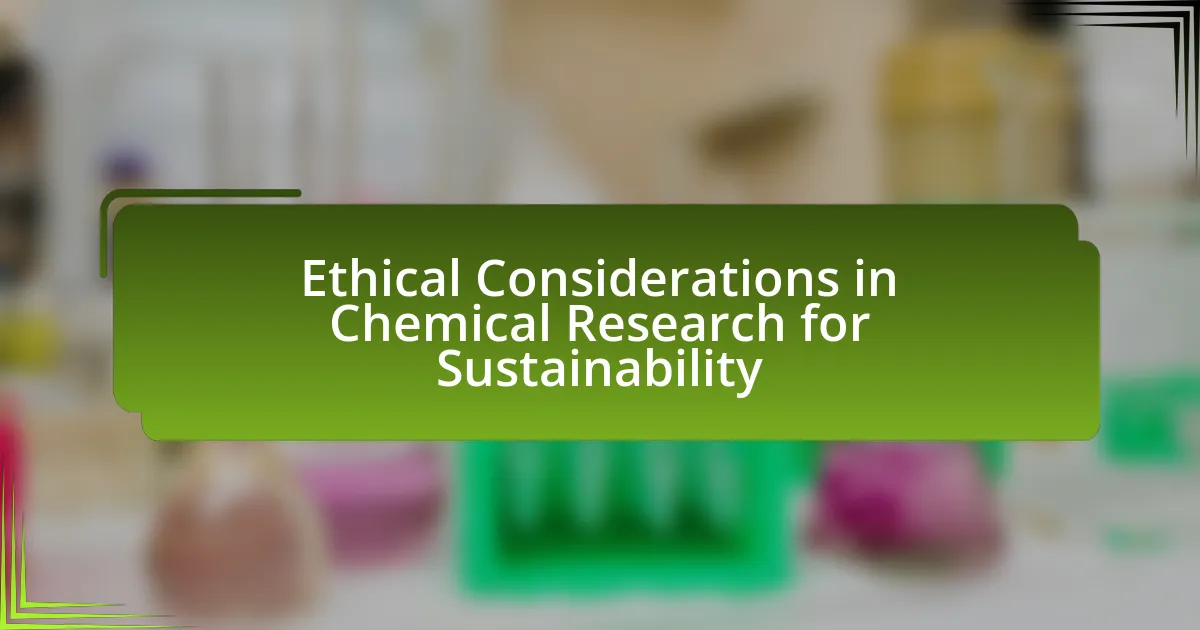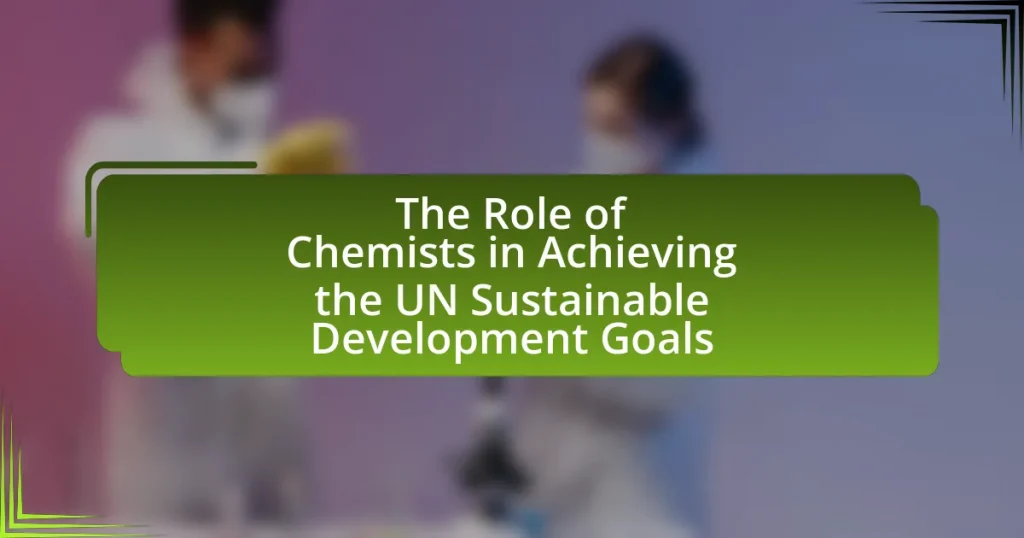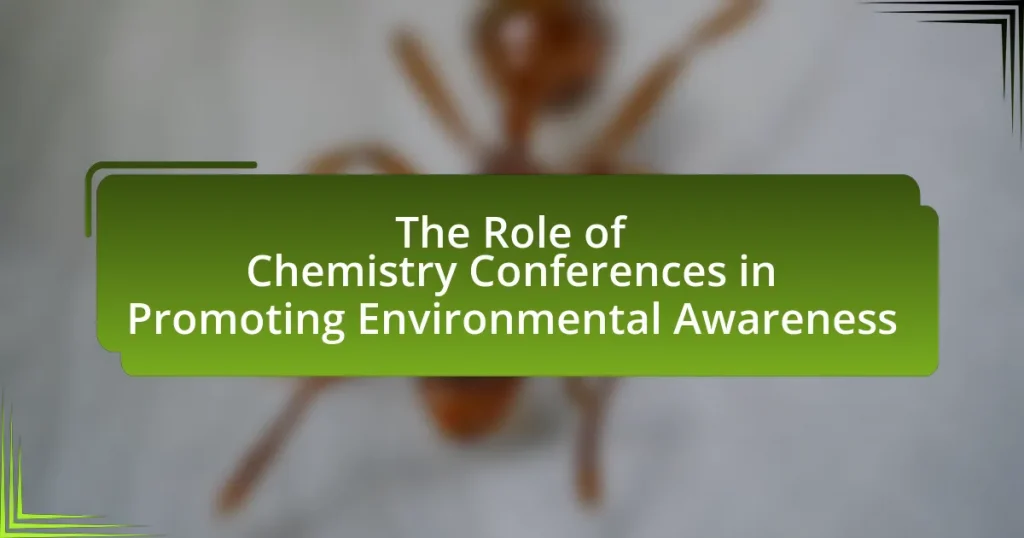The article focuses on ethical considerations in chemical research for sustainability, emphasizing the responsibility of researchers to minimize environmental impact, ensure human health safety, and promote social equity. It outlines the importance of green chemistry practices, transparency in reporting, and community engagement as essential components of ethical research. Key ethical principles such as integrity, safety, and environmental responsibility are discussed, along with the impact of ethical considerations on research outcomes and the potential consequences of unethical practices. The article also highlights the role of regulatory frameworks and best practices in guiding ethical decision-making within the field.

What are the Ethical Considerations in Chemical Research for Sustainability?
Ethical considerations in chemical research for sustainability include the responsibility to minimize environmental impact, ensure safety for human health, and promote social equity. Researchers must prioritize the development of green chemistry practices that reduce hazardous substances and waste, as evidenced by the 12 principles of green chemistry established by Paul Anastas and John Warner, which advocate for sustainable practices in chemical processes. Additionally, ethical research requires transparency in reporting results and potential risks, as well as engaging with communities affected by chemical production and usage, ensuring that their voices are heard and considered in decision-making processes.
Why is ethics important in chemical research for sustainability?
Ethics is crucial in chemical research for sustainability because it ensures that scientific practices prioritize environmental protection and social responsibility. Ethical guidelines help researchers evaluate the potential impacts of their work on ecosystems and communities, promoting the development of safer, more sustainable chemical processes. For instance, the American Chemical Society emphasizes the importance of ethical considerations in research to prevent harm and foster innovation that aligns with sustainable development goals. By adhering to ethical standards, researchers can contribute to solutions that address global challenges such as climate change and resource depletion, ultimately leading to a more sustainable future.
What ethical principles guide chemical research practices?
Ethical principles guiding chemical research practices include integrity, safety, environmental responsibility, and respect for human rights. Integrity ensures that researchers conduct their work honestly and transparently, avoiding fabrication or falsification of data. Safety emphasizes the importance of protecting researchers, participants, and the public from harm, adhering to established safety protocols. Environmental responsibility mandates that researchers consider the ecological impact of their work, striving to minimize harm to the environment and promote sustainability. Respect for human rights involves ensuring that research practices uphold the dignity and rights of individuals, particularly in studies involving human subjects. These principles are essential for fostering trust and accountability in the scientific community, as highlighted by the American Chemical Society’s guidelines on ethical practices in chemical research.
How do ethical considerations impact research outcomes?
Ethical considerations significantly impact research outcomes by ensuring integrity, accountability, and social responsibility in scientific practices. When researchers adhere to ethical guidelines, they enhance the credibility of their findings, which can lead to greater acceptance and application of their work in real-world scenarios. For instance, studies that prioritize ethical treatment of human subjects and environmental sustainability tend to yield results that are more widely trusted and utilized, as seen in the field of chemical research where adherence to ethical standards has led to innovations in sustainable practices. Furthermore, ethical lapses can result in retracted studies, loss of funding, and damage to reputations, underscoring the importance of ethics in maintaining the validity and reliability of research outcomes.
What are the key ethical dilemmas faced in chemical research?
Key ethical dilemmas faced in chemical research include the potential for environmental harm, the safety of human subjects, and the implications of research findings on public health. Environmental harm arises when chemical processes lead to pollution or depletion of natural resources, as seen in cases where industrial chemicals contaminate water supplies. The safety of human subjects is a critical concern, particularly in research involving pharmaceuticals, where adverse effects can occur, necessitating strict ethical guidelines to protect participants. Additionally, the implications of research findings can lead to misuse or misinterpretation, as evidenced by the historical misuse of chemical research in warfare, highlighting the need for responsible communication and application of scientific knowledge.
How do researchers balance innovation and safety?
Researchers balance innovation and safety by implementing rigorous risk assessment protocols and adhering to regulatory standards throughout the research process. This approach ensures that new chemical developments do not compromise public health or environmental integrity. For instance, the use of safety data sheets and hazard assessments allows researchers to identify potential risks associated with new compounds, enabling them to modify experimental designs accordingly. Additionally, frameworks such as the Responsible Care initiative promote safety and sustainability in chemical research by encouraging best practices and continuous improvement. These measures collectively ensure that innovation occurs within a safe and ethical framework, minimizing adverse impacts while fostering advancements in the field.
What role does transparency play in ethical chemical research?
Transparency is crucial in ethical chemical research as it fosters trust, accountability, and reproducibility. By openly sharing methodologies, data, and results, researchers enable peer review and public scrutiny, which are essential for validating findings and ensuring safety. For instance, the publication of research data in open-access formats has been shown to enhance collaboration and innovation within the scientific community, as evidenced by studies indicating that transparent practices lead to increased citation rates and broader dissemination of knowledge. Thus, transparency not only upholds ethical standards but also contributes to the advancement of sustainable practices in chemical research.
How do regulatory frameworks influence ethical considerations?
Regulatory frameworks significantly influence ethical considerations by establishing guidelines that dictate acceptable practices within chemical research. These frameworks, such as the REACH regulation in the European Union, require researchers to assess the safety and environmental impact of chemical substances, thereby promoting ethical responsibility in sustainability efforts. By mandating transparency and accountability, regulatory frameworks ensure that ethical considerations are integrated into research processes, ultimately guiding researchers to prioritize public health and environmental protection.
What are the main regulations governing chemical research ethics?
The main regulations governing chemical research ethics include the Declaration of Helsinki, the Belmont Report, and the Chemical Facility Anti-Terrorism Standards (CFATS). The Declaration of Helsinki, established by the World Medical Association, outlines ethical principles for medical research involving human subjects, emphasizing informed consent and the welfare of participants. The Belmont Report, published by the U.S. National Commission for the Protection of Human Subjects of Biomedical and Behavioral Research, identifies key ethical principles such as respect for persons, beneficence, and justice, which are applicable to chemical research involving human subjects. CFATS, enforced by the Department of Homeland Security, sets security standards for chemical facilities to prevent terrorist attacks, thereby ensuring ethical practices in the handling of hazardous materials. These regulations collectively ensure that chemical research is conducted ethically, prioritizing safety, participant rights, and environmental sustainability.
How do these regulations promote sustainability in research?
Regulations promote sustainability in research by establishing guidelines that ensure environmentally responsible practices and resource conservation. These regulations often require researchers to assess the environmental impact of their work, leading to the adoption of greener methodologies and materials. For instance, regulations may mandate the use of less hazardous substances, thereby reducing waste and pollution. Additionally, compliance with sustainability standards can enhance funding opportunities, as many grant agencies prioritize projects that align with sustainable practices. This alignment not only fosters innovation in sustainable technologies but also encourages collaboration among researchers to share best practices and solutions for environmental challenges.

What are the implications of unethical practices in chemical research?
Unethical practices in chemical research can lead to significant consequences, including compromised public safety, environmental harm, and erosion of trust in scientific integrity. For instance, falsifying data can result in the approval of harmful substances, which may pose health risks to humans and ecosystems. A notable example is the case of the fraudulent research on the safety of certain chemicals, which led to widespread environmental contamination and public health crises. Furthermore, unethical practices can stifle innovation by discouraging collaboration and transparency, ultimately hindering advancements in sustainable chemical solutions. The repercussions extend to legal ramifications, where institutions may face lawsuits and penalties, further damaging their reputation and financial stability.
What are the potential consequences of unethical chemical research?
Unethical chemical research can lead to severe consequences, including environmental damage, public health risks, and loss of trust in scientific institutions. For instance, the release of toxic substances during unethical experiments can contaminate ecosystems, as seen in the case of the Love Canal disaster, where improper disposal of hazardous waste resulted in significant health issues for residents. Additionally, unethical practices can compromise the integrity of scientific data, leading to misguided policies and regulations that fail to protect communities. The repercussions extend to legal ramifications for researchers and institutions involved, as well as potential financial losses due to lawsuits and damage to reputation.
How can unethical practices affect public health and the environment?
Unethical practices can significantly harm public health and the environment by leading to the release of toxic substances and the degradation of natural resources. For instance, industries that prioritize profit over safety may improperly dispose of hazardous waste, contaminating water supplies and harming ecosystems. A study published in the journal Environmental Health Perspectives found that exposure to pollutants from unethical industrial practices is linked to increased rates of respiratory diseases and cancers in nearby populations. Furthermore, unethical agricultural practices, such as the excessive use of pesticides, can lead to soil degradation and loss of biodiversity, which ultimately affects food security and public health.
What are the long-term impacts on scientific integrity?
Long-term impacts on scientific integrity include diminished public trust, compromised research quality, and increased skepticism towards scientific findings. When ethical standards are not upheld, as evidenced by cases like the 2009 Climategate incident, public confidence in scientific institutions can erode significantly. This erosion leads to a reluctance among stakeholders to accept scientific recommendations, ultimately hindering progress in fields such as chemical research for sustainability. Furthermore, a culture of misconduct can result in a proliferation of unreliable studies, which undermines the foundational principles of reproducibility and transparency in science. The long-term consequences manifest as a cycle of distrust that can stifle innovation and collaboration essential for addressing global challenges.
How can ethical breaches be prevented in chemical research?
Ethical breaches in chemical research can be prevented through the implementation of strict regulatory frameworks and adherence to ethical guidelines. Establishing comprehensive protocols that include regular audits, peer reviews, and transparency in research practices ensures accountability among researchers. For instance, the American Chemical Society emphasizes the importance of ethical training and the establishment of Institutional Review Boards (IRBs) to oversee research proposals, which helps mitigate risks of misconduct. Furthermore, fostering a culture of integrity within research institutions encourages open communication about ethical concerns, thereby reducing the likelihood of unethical behavior.
What role does education play in promoting ethical research practices?
Education plays a crucial role in promoting ethical research practices by equipping researchers with the knowledge and skills necessary to understand and apply ethical standards in their work. Through formal training and coursework, researchers learn about ethical guidelines, the importance of integrity, and the potential consequences of unethical behavior, such as data fabrication or plagiarism. For instance, programs that incorporate ethics into the curriculum, such as the National Institutes of Health’s training on responsible conduct of research, have been shown to increase awareness and adherence to ethical standards among researchers. This foundational education fosters a culture of accountability and responsibility, essential for maintaining public trust and advancing scientific knowledge in fields like chemical research for sustainability.
How can institutions enforce ethical standards in research?
Institutions can enforce ethical standards in research by implementing comprehensive policies, conducting regular training, and establishing oversight committees. These policies should clearly define ethical guidelines and consequences for violations, ensuring researchers understand their responsibilities. Regular training sessions can reinforce the importance of ethical conduct and keep researchers updated on best practices. Oversight committees, such as Institutional Review Boards (IRBs), play a crucial role in reviewing research proposals to ensure compliance with ethical standards, thereby safeguarding the integrity of the research process.

What best practices can enhance ethical considerations in chemical research for sustainability?
Implementing transparent peer review processes enhances ethical considerations in chemical research for sustainability. Transparency in peer review allows for greater scrutiny of research methodologies and findings, ensuring that ethical standards are upheld. Additionally, engaging stakeholders, including communities affected by chemical research, fosters accountability and aligns research objectives with societal needs. Research indicates that involving diverse perspectives can lead to more sustainable outcomes, as seen in studies like “The Role of Stakeholder Engagement in Sustainable Chemical Research” published in the Journal of Cleaner Production. This approach not only promotes ethical practices but also encourages innovation in sustainable solutions.
How can researchers integrate ethics into their research design?
Researchers can integrate ethics into their research design by incorporating ethical guidelines and frameworks at every stage of the research process. This includes conducting thorough ethical reviews, obtaining informed consent from participants, ensuring transparency in methodology, and considering the potential societal impacts of their work. For instance, the American Chemical Society emphasizes the importance of ethical considerations in research, highlighting that researchers should assess the risks and benefits of their studies to promote sustainability and social responsibility. By adhering to established ethical standards, researchers can ensure that their work contributes positively to society while minimizing harm.
What frameworks can guide ethical decision-making in research?
Ethical decision-making in research can be guided by several frameworks, including the Belmont Report, the Declaration of Helsinki, and the Ethical Guidelines for Research involving Humans by the American Psychological Association. The Belmont Report emphasizes respect for persons, beneficence, and justice, providing a foundational ethical framework for research involving human subjects. The Declaration of Helsinki outlines ethical principles for medical research, focusing on the welfare of research participants and the necessity of informed consent. The American Psychological Association’s guidelines offer specific ethical standards for psychological research, ensuring the protection of participants and integrity in research practices. These frameworks collectively establish a comprehensive approach to ethical decision-making in research, ensuring that the rights and welfare of participants are prioritized.
How can collaboration enhance ethical practices in chemical research?
Collaboration can enhance ethical practices in chemical research by fostering diverse perspectives and shared accountability among researchers. When scientists from various disciplines and institutions work together, they can identify and address ethical dilemmas more effectively, ensuring that research aligns with societal values and environmental sustainability. For instance, interdisciplinary collaborations can lead to the development of safer chemical processes that minimize environmental impact, as seen in projects like the Green Chemistry Initiative, which emphasizes sustainable practices in chemical manufacturing. This collective approach not only promotes transparency but also encourages adherence to ethical standards, as researchers are more likely to hold each other accountable and share best practices.
What resources are available for researchers to improve ethical practices?
Researchers can access various resources to improve ethical practices, including institutional review boards (IRBs), ethical guidelines from professional organizations, and training programs on research ethics. IRBs provide oversight to ensure research complies with ethical standards, while organizations like the American Chemical Society offer specific ethical guidelines tailored to chemical research. Additionally, online platforms such as the Collaborative Institutional Training Initiative (CITI) provide comprehensive training modules on ethical research practices, enhancing researchers’ understanding and application of ethical principles in their work.
What organizations provide guidance on ethical chemical research?
Organizations that provide guidance on ethical chemical research include the American Chemical Society (ACS), the Royal Society of Chemistry (RSC), and the International Union of Pure and Applied Chemistry (IUPAC). The ACS offers a code of ethics that emphasizes integrity and responsibility in chemical research, while the RSC promotes best practices and ethical standards through its guidelines. IUPAC also contributes by establishing international standards and ethical frameworks for chemical research. These organizations collectively ensure that researchers adhere to ethical principles, fostering sustainability and safety in the field.
How can researchers stay updated on ethical standards and practices?
Researchers can stay updated on ethical standards and practices by regularly consulting established guidelines from reputable organizations such as the American Chemical Society and the International Council for Science. These organizations publish updated ethical codes and best practices that reflect current standards in research ethics. Additionally, attending workshops, conferences, and webinars focused on ethics in research provides opportunities for researchers to engage with experts and discuss recent developments. Subscribing to relevant journals and newsletters also ensures access to the latest research and discussions surrounding ethical considerations in chemical research.
What practical steps can researchers take to ensure ethical compliance?
Researchers can ensure ethical compliance by implementing a comprehensive ethical review process before initiating any study. This process should include obtaining informed consent from participants, ensuring transparency in research objectives, and adhering to established ethical guidelines such as the Declaration of Helsinki. Additionally, researchers must conduct regular training on ethical standards for all team members and establish a system for reporting unethical behavior. Evidence shows that adherence to ethical guidelines not only protects participants but also enhances the credibility and reliability of research outcomes, as highlighted in the Belmont Report, which emphasizes respect for persons, beneficence, and justice in research practices.



